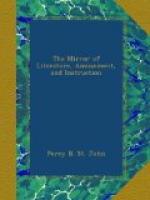“Soft
Lydian airs
Married to immortal verse,
Such as the meeting soul may pierce
In notes, with many a winding bout
Of linked sweetness long drawn out,
With wanton heed and giddy cunning;
The melting voice through mazes running,
Untwisting all the chains that tie
The hidden soul of harmony.”
so illustrated as in the last line of Gay’s “Black-eyed Susan,”—
“Adieu, she cried, and waved her lily hand,”
as sung by Incledon in his prime.
’Tis strange! here was “a voice that hath failed,” and little or nothing said of it—“Died at Worcester, on ——, the celebrated vocalist, Charles Incledon,” without further comment, was all that most of the periodicals said at his decease. I recollect nothing worthy of him being put forth, no essay upon his voice and style—and why? because poor Charles Incledon had ceased to be the fashion!
The time is somewhat advanced, but the quotation at the head of this article has brought to my mind what ought to have been done by abler hands; and I will endeavour to point out what we possessed in this singer, and what we have lost by his death.
And how am I qualified, for the task? With respect to the knowledge of the science of music I cannot boast—but Rousseau says—“Disoit autrefois un sage, c’est an poete a faire de la poesie, et an musicien a faire de la musique; mais il n’appartient qu’au philosophe de bien parle de l’une et de l’autre.” And there are hearts, such as inspired the poet when he wrote—




